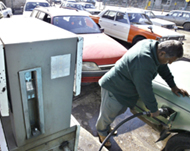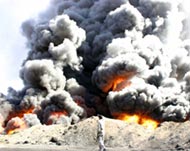Iraq oil exports hit post-war low
Oil exports from Iraq – which is estimated to have the world’s second largest reserves – have hit a record post-war low, an Oil Ministry spokesman says.

Exports of crude, which had run at an average of about 1.6 million barrels per day (mbpd) since the end of the 2003 war, dropped to 1.2 mbpd in November and 1.1 mbpd in December, spokesman Assem Jihad said on Monday.
“This was due to a combination of bad weather in the Gulf” where tankers hook up at terminals to take on crude as well as to “lack of electricity” to pump the oil, he said.
Exports from the north, by way of Turkey, were also badly affected by attacks, he said.
Anti-US and anti-government fighters have targeted oil facilities because of the vital importance to the government of crude exports, which make up 97% of its revenues.
Oil minister quits
Also on Monday, Ibrahim Bahr al-Uloum, Iraq’s oil minister, said he had submitted his resignation.
Uloum said he had resigned in opposition to fuel prices imposed by the government on 19 December.
 |
|
Iraq increased petrol and diesel |
He was put on leave against his will shortly after the price rises and has since been replaced as head of the ministry by Ahmad Chalabi, a deputy prime minister.
Chalabi is already head of the Oil Council, a cabinet-level board, and is influential on Iraq’s economic and commodities policy.
Commenting on Uloum’s departure, Shamkhi Faraj, director-general of economics and oil marketing, said the resignation would not have much impact because the government was about to change anyway after the election of 15 December.
“The government is in an interim period. He couldn’t have taken any important decisions, even if he hadn’t resigned. He would have had to wait for the new minister to take office.
“The impact will be limited.”
Security threats
The change at the top of the Oil Ministry comes after a month of turmoil in the oil sector. The government shut the country’s main refinery at Baiji in the north following security threats, and bad weather brought exports from Iraq’s southern ports to a halt.
Faraj said these and other factors had forced exports down to their lowest level since they began again in mid-2003 after the war to oust Saddam Hussein.
 |
|
Fighters have targeted the oil |
Iraq increased state-controlled prices of petrol and diesel by up to 200% two weeks ago, angering Iraqis who are used to paying heavily subsidised prices.
Uloum opposed the plan and said the price hikes should have been introduced gradually to satisfy both the demands of the International Monetary Fund for an end to subsidies and the demands of ordinary Iraqis for cheap fuel.
The government says the price hike was necessary to stop smuggling of cheap Iraqi oil products to other countries and also to discourage the black market inside Iraq.
Uloum said that Iraq had proposed a series of price increases to the IMF, but the IMF had asked for more.
IMF accord
“The IMF has asked the government to introduce different prices in order to sign the deal on 23 December,” Uloum said.
“This increase does not serve both the interests of the government and the Iraqi people,” he said.
Iraq signed a crucial loan accord with the IMF on 23 December. The $685 million IMF standby credit arrangement was the fund’s first ever with Iraq and was designed to support its economic programme over the next 15 months.